$1.2 Million in Grants for Alzheimer’s, Down Syndrome Research
November 29th, 2012 by Global Down Syndrome Foundation
![]() The Alzheimer’s Association, the Linda Crnic Institute for Down Syndrome and the Global Down Syndrome Foundation today launched a new research initiative to better understand the development of Alzheimer’s disease in individuals with Down syndrome (DS) and translate the research into improved treatments for people at risk to develop Alzheimer’s.
The Alzheimer’s Association, the Linda Crnic Institute for Down Syndrome and the Global Down Syndrome Foundation today launched a new research initiative to better understand the development of Alzheimer’s disease in individuals with Down syndrome (DS) and translate the research into improved treatments for people at risk to develop Alzheimer’s.
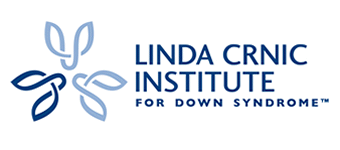 The organizations are making a total of $1.2 million available for new research projects, and have issued a Request for Applications (RFA) titled Understanding the Development and Devising Treatments for Alzheimer’s Disease in Individuals with Down Syndrome.
The organizations are making a total of $1.2 million available for new research projects, and have issued a Request for Applications (RFA) titled Understanding the Development and Devising Treatments for Alzheimer’s Disease in Individuals with Down Syndrome.
![]() “Through this new initiative, we hope to better understand the mechanisms that lead to Alzheimer’s in people with Down syndrome in order to get us a big step closer to new treatments,” said William Thies, Ph.D., Alzheimer’s Association chief medical and scientific officer. “The eventual goal is to advance the charge toward better Alzheimer’s therapies for people with Down syndrome and for people without it.”
“Through this new initiative, we hope to better understand the mechanisms that lead to Alzheimer’s in people with Down syndrome in order to get us a big step closer to new treatments,” said William Thies, Ph.D., Alzheimer’s Association chief medical and scientific officer. “The eventual goal is to advance the charge toward better Alzheimer’s therapies for people with Down syndrome and for people without it.”
“We’re pleased to have leaders that represent a significant scientific brain trust leading this program, and we are grateful to have the scientific review apparatus and peer reviewers provided by the Alzheimer’s Association,” said Michelle Sie Whitten, Executive Director of the Global Down Syndrome Foundation.
To read the full press release, click here.
Alzheimer’s Association, Linda Crnic Institute, Global Down Syndrome Foundation Launch Research Grants Program
November 29th, 2012 by Global Down Syndrome Foundation
Initial $1.2 million aims to fund research to better treat Alzheimer’s in people with Down syndrome and the general population
CHICAGO & DENVER (November 29, 2012) – The Alzheimer’s Association, the Linda Crnic Institute for Down Syndrome and the Global Down Syndrome Foundation today launched a new research initiative to better understand the development of Alzheimer’s disease in individuals with Down syndrome (DS) and translate the research into improved treatments for people at risk to develop Alzheimer’s.
The organizations are making a total of $1.2 million available for new research projects, and have issued a Request for Applications (RFA) titled Understanding the Development and Devising Treatments for Alzheimer’s Disease in Individuals with Down Syndrome. Letters of intent must be received by February 1, 2013, and applications must be received by March 1, 2013.
“Through this new initiative, we hope to better understand the mechanisms that lead to Alzheimer’s in people with Down syndrome in order to get us a big step closer to new treatments,” said William Thies, Ph.D., Alzheimer’s Association chief medical and scientific officer. “The eventual goal is to advance the charge toward better Alzheimer’s therapies for people with Down syndrome and for people without it.”
“We’re pleased to have leaders that represent a significant scientific brain trust leading this program, and we are grateful to have the scientific review apparatus and peer reviewers provided by the Alzheimer’s Association,” said Michelle Sie Whitten, Executive Director of the Global Down Syndrome Foundation.
Alzheimer’s Disease and Down Syndrome
According to the U.S. Centers for Disease Control, Down syndrome occurs in 1 out of 691 infants in the United States and is caused by inheritance of three copies of chromosome 21. In addition to early physical and intellectual challenges, individuals with Down syndrome are at a high risk for developing the symptoms characteristic of Alzheimer’s. People with Down syndrome develop the two hallmarks of Alzheimer’s disease – amyloid plaques and tau tangles – in their 30s and 40s. Due to improved clinical care, people with Down syndrome are now regularly living into their sixth decade of life, causing many to develop dementia due to Alzheimer’s.
The high incidence of the symptoms characteristic of Alzheimer’s in people with Down syndrome is thought to be due to the extra copy of chromosome 21, which contains the gene that encodes the amyloid precursor protein (APP). APP is cleaved to form the amyloid-beta peptide; the primary component of plaques. It has been presumed that the extra copy of the gene produces an abnormally high amount of amyloid-beta.
The Funding Mechanism
This joint grant-making initiative is designed to enable preliminary pilot research or “proof-of-principle” studies that can provide strong initial data in order for the scientists to then obtain additional research support for larger-scale projects from other funding agencies.
The Alzheimer’s Association and the Linda Crnic Institute for Down syndrome have identified several potential themes on which researchers may submit projects, including:
- Can Down syndrome animal models provide new insights into the initiation and development of Alzheimer’s?
- Are therapies given before the emergence of dementia symptoms capable of slowing or blocking the development of Alzheimer’s in cellular and animal models of Down syndrome?
- Could early, non-drug interventions not only reduce the early physical and intellectual challenges caused by Down syndrome, but also slow and/or reduce the onset of Alzheimer’s disease?
- Can Alzheimer’s biomarkers be used in people with Down syndrome to identify the earliest onset of Alzheimer’s disease-related changes?
- Can cognitive tests be developed to measure Alzheimer’s-related memory impairment and early dementia in people with Down syndrome?
Proposals will be considered from both senior investigators and new investigators independently. Each Senior Investigator award has a maximum of $300,000 for two to three years. Each New Investigator award has maximum of $150,000 for two to three years. Funding will be awarded by August 30, 2013. For submission criteria, deadlines and other details, contact: grantsapp@alz.org or call 312-335-5747 or 312-335-5862.
More information can be found at: www.alz.org/research/alzheimers_grants/types_of_grants.asp
This innovative funding initiative grew out of a groundbreaking September 2012 workshop cosponsored by the Alzheimer’s Association, the Linda Crnic Institute for Down Syndrome and the Global Down Syndrome Foundation.
“The September workshop held by our organizations brought together key scientists from the fields of Alzheimer’s and Down syndrome research,” said Dean Hartley, Ph.D., director of science initiatives for the Alzheimer’s Association. “We are very pleased that one significant outcome of that workshop is this much-needed joint grant-making program that can clearly help both of our populations.”
“Collaborating closely with the Alzheimer’s Association makes perfect sense to us,” added Tom Blumenthal, Ph.D., Executive Director of the Crnic Institute. “Our goal is to foster and fund research that has direct benefit for people with Down syndrome and this joint grants program fulfills that goal.”
About the Alzheimer’s Association
The Alzheimer’s Association is the world’s leading voluntary health organization in Alzheimer care, support and research. Our mission is to eliminate Alzheimer’s disease through the advancement of research, to provide and enhance care and support for all affected, and to reduce the risk of dementia through the promotion of brain health. Our vision is a world without Alzheimer’s. Visit www.alz.org or call 800-272-3900.
About the Linda Crnic Institute for Down Syndrome
The Linda Crnic Institute for Down Syndrome is the first medical and research institute with the mission to provide the best clinical care to people with Down syndrome, and to eradicate the medical and cognitive ill effects associated with the condition. Established in 2008, the Crnic Institute is a partnership between the University of Colorado School of Medicine, the University of Colorado Boulder, and Children’s Hospital Colorado. Headquartered on the Anschutz Medical Campus, the Crnic Institute includes the Anna and John J. Sie Center for Down Syndrome at the Children’s Hospital Colorado. It partners both locally and globally to provide life-changing research and medical care for individuals with Down syndrome. The Crnic Institute is made possible by the generous support of the Anna and John J. Sie Foundation, and relies on the Global Down Syndrome Foundation for fundraising, education, awareness and government advocacy. It is a research and medical-based organization without political or religious affiliation or intention.
About the Global Down Syndrome Foundation
The Global Down Syndrome Foundation is a public non-profit 501(c)(3) dedicated to significantly improving the lives of people with Down syndrome through research, medical care, education and advocacy. Formally established in 2009, the Foundation’s primary focus is to support the Linda Crnic Institute for Down Syndrome, the first academic home in the US committed to research and medical care for people with the condition. Fundraising and government advocacy that corrects the alarming disparity of national funding for people with Down syndrome is a major short-term goal. The Foundation organizes the Be Beautiful Be Yourself Fashion Show – the single largest annual fundraiser benefitting people with Down syndrome. Programmatically, the Foundation organizes and funds many programs and conferences including the Dare to Play Football and Cheer Camps, Global Down Syndrome Educational Series, and Global Down Syndrome Multi-Language Resource Project. The Foundation is an inclusive organization without political or religious affiliation or intention.
# # #
Distribution Plans for Down Syndrome Prenatal Testing Pamphlet
November 28th, 2012 by Global Down Syndrome Foundation
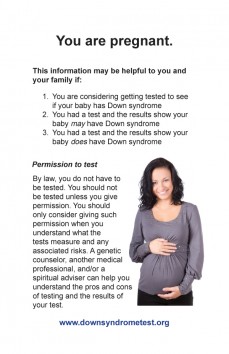 The Global Down Syndrome Foundation and the National Down Syndrome Congress are excited to announce distribution agreements that will get the new Down Syndrome Prenatal Testing Pamphlet in the hands of pregnant women across the U.S.
The Global Down Syndrome Foundation and the National Down Syndrome Congress are excited to announce distribution agreements that will get the new Down Syndrome Prenatal Testing Pamphlet in the hands of pregnant women across the U.S.
Amid the overwhelmingly positive response since the pamphlet’s release two weeks ago, the organizations anticipate the distribution of more than 100,000 pamphlets to pregnant women across the U.S. over the next year.
More than 1,000 of the up-to-date, accurate pamphlets have been requested through the pamphlet’s corresponding website, www.downsyndrometest.org, and a distribution agreement with Sequenom Center for Molecular Medicine will wind up with the pamphlets in medical offices across the U.S.
Sequenom CMM, one of the largest prenatal testing laboratories in the United States, will provide medical professionals with the pamphlet, and will recommend that those who administer their test offer the pamphlet to patients / expectant parents at the point of testing and diagnosis.
The pamphlet format allows for easy updates and distribution. The costs for approved distribution of the pamphlet (printing and shipping) will be incurred by Sequenom CMM, the Global Down Syndrome Foundation and the National Down Syndrome Congress. There is no financial benefit or incentive associated with the distribution agreements.
To read the complete press release announcing the distribution agreements, click here.
More Movies Are Featuring Actors with Down Syndrome
November 28th, 2012 by Global Down Syndrome Foundation
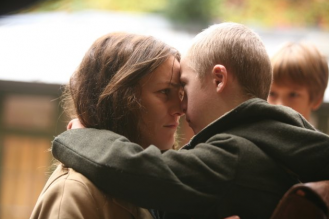
Vanessa Paradis and Marin Gerrier in "Cafe de Flore" / IMDB
Two movies out this fall feature young actors with Down syndrome as lead characters. “Cafe de Flore” features Vanessa Paradis as Jaqueline, a single mother whose son, Laurent (Marin Gerrier), has Down syndrome.
“Any Day Now” is the story of gay lovers who try to adopt a boy with Down syndrome, played by Los Angeles actor Isaac Leyva.
Both movies are part of a trend to include people with Down syndrome in the storylines of movies and TV. “Glee” and “The Secret Life of the American Teenager” (starring Global Down Syndrome Foundation Quincy Jones Exceptional Advocacy Award recipient Luke Zimmerman) are long-running examples.
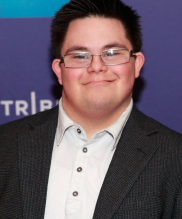
Isaac Leyva / IMDB
Though these new releases revolve around characters with Down syndrome, they are not focused on Down syndrome per se. Both films are about the love of families no matter the form they take.
Check out stories on the movies on Disability Scoop.
Distribution Announced for Down Syndrome Prenatal Testing Pamphlet
November 27th, 2012 by Global Down Syndrome Foundation
Website harnesses local distribution, Sequenom CMM to provide national footprint
DENVER/ATLANTA (Nov. 27, 2012) – The Global Down Syndrome Foundation and the National Down Syndrome Congress have announced distribution agreements for the hallmark Down Syndrome Prenatal Testing Pamphlet that provides current, accurate information about Down syndrome to pregnant women and families.
The organizations anticipate distributing 25,000 pamphlets in the next year through the pamphlet’s new corresponding website, www.downsyndrometest.org. In the two weeks since the website launched, more than 1,000 pamphlets have been requested and are in the process of being distributed to several states, including California, Michigan, West Virginia, Texas and Florida. These pamphlets will be delivered free of charge by the end of the year, and distributed to pregnancy centers, OBGYN offices, parent support groups and to participants at an upcoming perinatal conference.
In addition to local distribution accessed through the website, the pamphlet will be distributed nationally by Sequenom Center for Molecular Medicine TM (Sequenom CMM), one of the largest prenatal testing laboratories in the United States. Sequenom CMM will provide medical professionals with the pamphlet, and will recommend that those who administer their test offer the pamphlet to patients / expectant parents at the point of testing and diagnosis. In the next year, Sequenom CMM anticipates providing between 75,000 and 100,000 printed copies of the pamphlet to the medical centers and facilities administering the MaterniT21TM PLUS LDT.
“Sequenom CMM has expressed a desire to better understand the Down syndrome community’s concerns regarding prenatal testing, which opened up a discussion for them to distribute our pamphlet,” said David Tolleson, Executive Director of the National Down Syndrome Congress. “We appreciate their input on our pamphlet, and particularly the acknowledgment in their marketing materials that these tests can help a woman or family to ‘prepare medically, emotionally and financially for the birth of a child with special needs’.”
“It is so important to provide a pamphlet to pregnant women that explains both the prenatal testing associated with Down syndrome and facts about the condition,” said Michelle Sie Whitten, Executive Director of the Global Down Syndrome Foundation. “Requests for local distribution continue to grow through the website, and coupled with Sequenom CMM’s nationwide footprint, we expect to have a real and positive impact on thousands of pregnant women and their families.”
Dan Ketcherside, Director of Market Development at Sequenom CMM agreed, “Sequenom CMM encourages medical professionals to offer accurate information to pregnant women and their families about the conditions tested for through our products. The Global Down Syndrome Foundation and the National Down Syndrome Congress graciously included our perspective on prenatal testing in their pamphlet with messaging that mirrors the dialogue we’re already having with specialists around the country. We are honored to be a partner for this important educational material.”
The Global Down Syndrome Foundation and the National Down Syndrome Congress will continue to monitor advances in prenatal testing. They will also measure the impact of the pamphlet through follow-up surveys and update the pamphlet as appropriate. Sequenom CMM will also contribute to the pamphlet’s utility by surveying medical professionals on a quarterly basis.
The pamphlet format allows for easy updates and distribution. The costs for approved distribution of the pamphlet (printing and shipping) will be incurred by Sequenom CMM, the Global Down Syndrome Foundation and the National Down Syndrome Congress. There is no financial benefit or incentive associated with the distribution agreements.
For free downloads of the pamphlet or to learn more, visit www.downsyndrometest.org.
About the Global Down Syndrome Foundation
The Global Down Syndrome Foundation is a public nonprofit 501(c)(3) dedicated to significantly improving the lives of people with Down syndrome through research, medical care, education and advocacy. Formally established in 2009, the Foundation’s primary focus is to support the Linda Crnic Institute for Down Syndrome, the first academic home in the U.S. committed to research and medical care for people with the condition. Fundraising and government advocacy that corrects the alarming disparity of national funding for people with Down syndrome is a major short-term goal. The Foundation organizes the Be Beautiful Be Yourself Fashion Show — the single-largest annual fundraiser benefiting people with Down syndrome. Programmatically, the Foundation organizes and funds many programs and conferences, including the Dare to Play Football and Cheer Camps, Global Down Syndrome Educational Series, and Global Down Syndrome Multi-Language Resource Project. The Foundation is an inclusive organization without political or religious affiliation or intention.
About the National Down Syndrome Congress
Founded in 1973, the National Down Syndrome Congress is the oldest national organization for people with Down syndrome, their families, and the professionals who work with them. A 501(c)(3) non-profit advocacy organization, the NDSC provides free technical support and information about issues related to Down syndrome throughout the lifespan, as well as on matters of public policy relating to disability rights. Best known for its annual convention – the largest of its type in the world – the National Down Syndrome Congress is a grassroots organization recognized for its “family” feel, its “We’re More Alike than Different” public awareness campaign, and, its outreach to individuals from diverse backgrounds.
###
Thanksgiving Message from Global Down Syndrome Foundation
November 22nd, 2012 by Global Down Syndrome Foundation
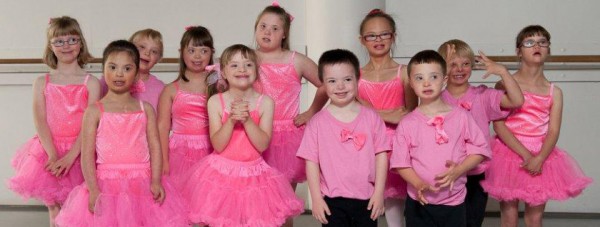

Dear Friends and Colleagues,
THANK YOU for your wonderful support of our work and most importantly for believing in a brighter future for our children and adults with Down syndrome.
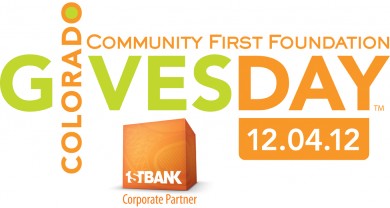 With your kind support, in 2012 we have:
With your kind support, in 2012 we have:
- Established the first national registry for people with Down syndrome through the National Institutes of Health
- Established the Down Syndrome Prenatal Testing Pamphlet in collaboration with the NDSC
- Launched an annual $1 million research grant program through the Crnic Institute
- Provided expert medical care to over 500 children with Down syndrome through the Sie Center for Down Syndrome at Children’s Hospital Colorado
- Provided critical educational training to 70 teams of parents and professionals representing 28 schools
- Trained and organized 500 self-advocates and their family members to meet with their legislative representatives in Washington DC
- Launched three new programs for people with Down syndrome and maintained seven others
- Successfully held the Be Beautiful Be Yourself Fashion Show fundraisers in Denver and Washington DC
- Co-organized the first Alzheimer’s disease-Down syndrome scientific summit with the national Alzheimer’s Association
YOU have enabled us to be positive agents of change. We cannot thank you all enough for making our work possible!
As you reflect on life and family over the Thanksgiving weekend, and consider your year-end giving, I hope you will consider helping us to fulfill a year-end goal to support our newest initiative – the establishment of the first Alzheimer’s disease clinical care center in Colorado. In fact it will be the only one in a 600-mile radius of Denver! If you donate by December 4th to our Colorado Gives Day site, your donation will be matched dollar for dollar.
For our friends in the US and Americans abroad, have a wonderful (and safe!) Thanksgiving holiday!
With much gratitude,
Michelle Sie Whitten and the team at Global Down Syndrome Foundation
Announcing the Winner of Our First Halloween Photo Contest
November 20th, 2012 by Global Down Syndrome Foundation
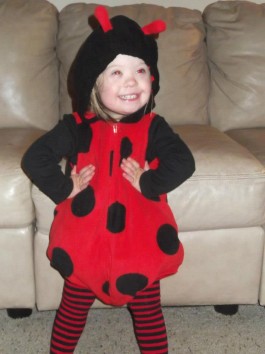
Mady
The Global Down Syndrome Foundation is happy to announce the winner of our first Halloween Costume Photo Contest: Mady Kirkpatrick of Illinois dressed as a ladybug for Halloween, and her photo led the pack with an amazing 639 likes on our Facebook album page!
The Global Down Syndrome Foundation is donating $250 to UPS for DownS, the local Down syndrome nonprofit organization selected by Mady’s parents, Vicki and Gregg. UPS for DownS stands for United Parent Support for Down Syndrome, serving families that love someone with Down syndrome.
Mady is 2 years old and will turn 3 on Christmas Day. This was the first Halloween that Mady was able to walk up to the doors while she was trick-or-treating. Her speech therapist made her a sign that said “Trick or Treat,” and she proudly show her sign and say “TREAT!!!” Then she’d turn the sign around, and it read “Thank you.” She would then use sign language to say thanks for the treats.
She has three older sisters, and her mom says she loves to follow their lead. One night, her oldest sister was dancing, and Mady watched and repeated her moves. Then Mady would do a move, and her sister would copy her. After going back and forth a few times, Mady did the splits, and her sister couldn’t duplicate it, so Mady got up, clapped and said, “Yea!,” feeling like she won the “competition.”
Mady’s mom says Mady is a fighter. “She was close to death a couple of times, and thankfully she fought back … AND WON!!!” she says. “She doesn’t give up on learning, even when she has had enough. We always joke and say instead of having plenty of Attitude, she has plenty of Mad-a-tude.”
Mady loves learning new things and playing on the iPad. Her favorite food is cookies of any kind.
“Gregg and I feel so lucky to have Mady and her sisters in our lives,” Vicki says. “They have changed us for the better. We treasure every moment with them!”
Thank you to everyone who shared their photos in the contest. Every photo showed the world a precious child and put smiles on countless faces.
National Down Syndrome Organizations Collaborate on Prenatal Testing Issues
November 19th, 2012 by Global Down Syndrome Foundation
National Down Syndrome Congress, National Down Syndrome Society and Global Down Syndrome Foundation Collaborate on Prenatal Testing Issues
Multiple educational resources and tools exemplify unity around important global issues
ATLANTA/NEW YORK/DENVER (Monday, Nov. 19, 2012) – The National Down Syndrome Congress (NDSC), the National Down Syndrome Society (NDSS), and the Global Down Syndrome Foundation (Global) announced a collaborative effort to create multiple educational resources and tools to address prenatal testing issues facing pregnant women as well as the Down syndrome community.
Earlier this month, the Global Down Syndrome Foundation and the National Down Syndrome Congress published the first Down Syndrome Prenatal Testing Pamphlet, an accurate, informative, easy-to-read resource for pregnant women and their families. The pamphlet is available in English and Spanish at www.downsyndrometest.org and is being distributed to pregnant women and to medical professionals who work with pregnant women. The creation of the pamphlet included input from medical professionals, parents, and survey results from over 200 people in the Down syndrome community.
“NDSS applauds the efforts of NDSC and Global in getting this pamphlet out to women and families. NDSS has a long history of working on prenatal testing issues, and the NDSS statement on prenatal testing guides our involvement on this critical issue for our community, along with our Prenatal Testing Committee, made up of providers with decades of experience on prenatal testing, self-advocates, parents, board members, and staff,” said Jon Colman, President of NDSS.
In addition to the Down Syndrome Prenatal Testing Pamphlet, NDSC and Global support the prenatal testing information state advocacy initiative being rolled out by NDSS. As part of its effort to ensure accurate, up-to-date and balanced information on prenatal testing, NDSS has created a first-of-its-kind toolkit that encourages states to pass legislation modeled after a bill recently passed in Massachusetts.
The legislation echoes the Prenatally and Postnatally Diagnosed Conditions Act (also known as the Kennedy-Brownback bill), which increases the provision of scientifically sound information and support services to patients receiving a positive test diagnosis for Down syndrome or other prenatally and postnatally diagnosed conditions. This toolkit includes state model legislation and advocacy tools. NDSS is working with local Down syndrome organizations and its statewide government affairs committees to pass prenatal information laws in several states.
“The work of the NDSS and our pamphlet truly go hand in hand,” said David Tolleson, Executive Director of NDSC. “They are making the requirements of the Kennedy-Brownback bill – providing accurate information about prenatal testing and Down syndrome at the point of diagnosis – stronger on a state by state level. As they succeed, we will be there with our pamphlet to fulfill that requirement.”
“Working with NDSC and NDSS has been so exciting. As a parent, it is heartwarming to see so many excellent organizations coming together working on important global issues that affect hundreds of thousands of people,” said Michelle Sie Whitten, Executive Director of the Global Down Syndrome Foundation. “Besides NDSC, NDSS and Global, we now have Down Syndrome Affiliates in Action, the International Mosaic Down Syndrome Association and so many others. I honestly believe that today, more so than any time I have seen in the past, there is such a wonderful sense of passion, purpose, and professionalism in the Down syndrome community. When you put those three ‘p’s’ together, the impact we are having is truly astounding.”
NDSC, NSSS and Global all have important information about prenatal testing and facts about Down syndrome on their websites. To view that information, please visit:
- www.ndsccenter.org/resources/new-and-expectant-parents
- http://www.ndss.org/Resources/New-Expectant-Parents/Understanding-a-Diagnosis-of-Down-Syndrome/
- http://www.globaldownsyndrome.org/about-down-syndrome/facts-about-down-syndrome
About the National Down Syndrome Congress
Founded in 1973, the National Down Syndrome Congress is the oldest national organization for people with Down syndrome, their families, and the professionals who work with them. A 501(c)(3) non-profit advocacy organization, the NDSC provides free technical support and information about issues related to Down syndrome throughout the lifespan, as well as on matters of public policy relating to disability rights. Best known for its annual convention – the largest of its type in the world – the National Down Syndrome Congress is a grassroots organization recognized for its “family” feel, its “We’re More Alike than Different” public awareness campaign, and, its outreach to individuals from diverse backgrounds.
About the National Down Syndrome Society
Since 1979, the National Down Syndrome Society (“NDSS”) has worked to promote the value, acceptance and inclusion of people with Down syndrome. NDSS has about 350 affiliates nationwide. The NDSS National Policy Center works with Congress and federal agencies to protect the rights of people with Down syndrome, and educates individuals to advocate on local, state and national levels. The largest NDSS public awareness campaign is My Great Story, which ignites a new way of thinking about people with Down syndrome by sharing stories written by and about them. The National Buddy Walk Program includes over 250 walks. NDSS envisions a world in which all people with Down syndrome have the opportunity to enhance their quality of life, realize their life aspirations, and become valued members of welcoming communities.
About the Global Down Syndrome Foundation
The Global Down Syndrome Foundation is a public nonprofit 501(c)(3) dedicated to significantly improving the lives of people with Down syndrome through research, medical care, education and advocacy. Formally established in 2009, the Foundation’s primary focus is to support the Linda Crnic Institute for Down Syndrome, the first academic home in the U.S. committed to research and medical care for people with the condition. Fundraising and government advocacy that corrects the alarming disparity of national funding for people with Down syndrome is a major short-term goal. The Foundation organizes the Be Beautiful Be Yourself Fashion Show — the single-largest annual fundraiser benefiting people with Down syndrome. Programmatically, the Foundation organizes and funds many programs and conferences, including the Dare to Play Football and Cheer Camps, Global Down Syndrome Educational Series, and Global Down Syndrome Multi-Language Resource Project. The Foundation is an inclusive organization without political or religious affiliation or intention.
Hallmark Down Syndrome Prenatal Testing Pamphlet Released
November 17th, 2012 by Global Down Syndrome Foundation
Global Down Syndrome Foundation, National Down Syndrome Congress Publish Hallmark Prenatal Testing Pamphlet for Pregnant Women
November 14th, 2012 by Global Down Syndrome Foundation
DENVER/ATLANTA (Nov. 14, 2012) – The Global Down Syndrome Foundation and the National Down Syndrome Congress announced the English and Spanish publication of the first Down Syndrome Prenatal Testing Pamphlet. The hallmark pamphlet will be distributed electronically and in print format nationally through medical professionals as well as available directly to pregnant women and families.
The Down Syndrome Prenatal Testing Pamphlet is intended to eliminate confusion at a time when advice and guidance can vary dramatically from doctor to doctor and counselor to counselor, and where there was previously no accessible, consistent resource for women and families. Recent research shows that the majority of medical students and doctors do not receive adequate training in prenatal diagnosis for Down syndrome and that parents often receive inaccurate information about the diagnosis.
“Although prenatal testing for Down syndrome has been available in the United States since the 1970s, there has not been an easy-to-read, easy-to-update pamphlet available for pregnant women distributed through the offices of medical professionals. The pamphlet that the Global Down Syndrome Foundation and the National Down Syndrome Congress are providing will be a much needed and welcomed resource,” said Nanette F. Santoro, M.D., Chair of the Department of Obstetrics and Gynecology at the University of Colorado School of Medicine.
The pamphlet was designed by a group of medical professionals, researchers, Down syndrome experts and parents over a six-month period. Through the websites, mailing lists and newsletters of the Global Down Syndrome Foundation and the National Down Syndrome Congress, more than 200 respondents from the Down syndrome community weighed in on a draft version of the pamphlet before its finalization.
Michelle Whitten, Executive Director of the Global Down Syndrome Foundation, explains, “Providing prenatal testing information for Down syndrome can be politically charged. But over 90% of survey respondents were on the same page about getting accurate information into the hands of pregnant women, and applauded our efforts. I believe that our organization and the National Down Syndrome Congress have been very respectful about listening to our community’s hopes and fears and providing an even-handed resource. Of course it is important to remember that our number one audience must be pregnant women.”
“We believe that this pamphlet goes a long way in satisfying the 2008 Prenatally and Postnatally Diagnosed Conditions Awareness Act co-sponsored by Senators Edward Kennedy (D-Mass.) and Sam Brownback (R-Kan.),” said David Tolleson, Executive Director of the National Down Syndrome Congress. “Our members and friends have been extremely supportive of this joint initiative with the Global Down Syndrome Foundation and we believe tens of thousands of women and families will benefit from having the current, accurate information presented in the pamphlet.”
The pamphlet also dispels the notion that new non-invasive 10-week blood tests for Down syndrome are diagnostic or 100% accurate. In fact, new blood tests on the market have shown high levels of accuracy only within a defined high-risk population (e.g. pregnant women over the age of 38). These tests are not recommended for women with low-risk pregnancies because their accuracy has not yet been demonstrated.
The Global Down Syndrome Foundation and the National Down Syndrome Congress will continue to measure the impact of the pamphlet through follow-up surveys and to monitor advances in prenatal testing, and the pamphlet will be updated as appropriate. The pamphlet format allows for easy updates and distribution.
Over the next several months, both organizations will be providing additional links and resources associated with a prenatal diagnosis of Down syndrome. For free downloads of the pamphlet or to learn more, visit www.downsyndrometest.org.
About the Global Down Syndrome Foundation
The Global Down Syndrome Foundation is a public nonprofit 501(c)(3) dedicated to significantly improving the lives of people with Down syndrome through research, medical care, education and advocacy. Formally established in 2009, the Foundation’s primary focus is to support the Linda Crnic Institute for Down Syndrome, the first academic home in the U.S. committed to research and medical care for people with the condition. Fundraising and government advocacy that corrects the alarming disparity of national funding for people with Down syndrome is a major short-term goal. The Foundation organizes the Be Beautiful Be Yourself Fashion Show — the single-largest annual fundraiser benefiting people with Down syndrome. Programmatically, the Foundation organizes and funds many programs and conferences, including the Dare to Play Football and Cheer Camps, Global Down Syndrome Educational Series, and Global Down Syndrome Multi-Language Resource Project. The Foundation is an inclusive organization without political or religious affiliation or intention.
About the National Down Syndrome Congress
Founded in 1973, the National Down Syndrome Congress is the oldest national organization for people with Down syndrome, their families, and the professionals who work with them. A 501(c)(3) non-profit advocacy organization, the NDSC provides free technical support and information about issues related to Down syndrome throughout the lifespan, as well as on matters of public policy relating to disability rights. Best known for its annual convention – the largest of its type in the world – the National Down Syndrome Congress is a grassroots organization recognized for its “family” feel, its “We’re More Alike than Different” public awareness campaign, and, its outreach to individuals from diverse backgrounds.
###

 Experience our inspirational and groundbreaking videos and photos. Our children and self-advocates are beautiful AND brilliant!
Experience our inspirational and groundbreaking videos and photos. Our children and self-advocates are beautiful AND brilliant! Make sure your local Representatives are on the Congressional Down Syndrome Task Force.
Make sure your local Representatives are on the Congressional Down Syndrome Task Force.